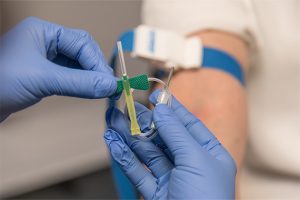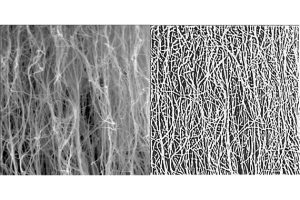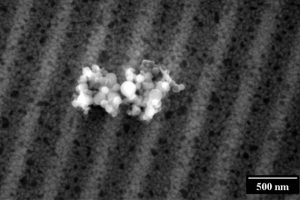
June 28, 2023
Mizzou Engineer outlines system to customize blood supply chain solutions
Blood supply chains can be complicated. On one hand, healthcare providers must make sure they have enough to meet demands, which can be unexpected. On the other hand, roughly 20 million donated platelets are discarded each year because they expire before they’re needed.

May 18, 2023
Smart material prototype challenges Newton’s laws of motion
For more than 10 years, Guoliang Huang, the Huber and Helen Croft Chair in Mechanical and Aerospace Engineering, has been investigating the unconventional properties of “metamaterials” — an artificial material that exhibits properties not commonly found in nature as defined by Newton’s laws of motion — in his long-term pursuit of designing an ideal metamaterial. Huang’s goal is to help control the “elastic” energy waves traveling through larger structures — such as an aircraft — without light and small “metastructures.”

April 10, 2023
Team develops technique using humidity to make 3D printing faster, more efficient
A Mizzou Engineering team has devised a new technique that uses humidity to make 3D printing faster and more efficient when fabricating small, complex structures.

March 15, 2023
Team develops technique to segment carbon nanotube forests in images
Mizzou Engineering researchers are another step closer to controlling the properties of carbon nanotubes growing in mass quantities.

Jan. 31, 2023
Study unexpectedly finds only 7 health symptoms directly related to ‘long COVID’
In a new study, a team of University of Missouri researchers made an unexpected discovery: people experiencing long-lasting effects from COVID-19 — known as “long COVID” or post-COVID conditions — are susceptible to developing only seven health symptoms for up to a year following the infection. They are: fast-beating heart, hair loss, fatigue, chest pain, shortness of breath, joint pain and obesity.

Jan. 26, 2023
Mizzou researchers provide direct evidence of localized explosion of aluminum nanoparticle
A Mizzou Engineering team has provided direct evidence of a localized explosion of an aluminum nanoparticle, a mechanism first theorized in 2006.

Nov. 29, 2022
Team develops technique to fabricate electronics onto everyday objects
A Mizzou Engineering team has developed a new technique to fabricate electronics onto everyday objects.

Sep. 21, 2022
Mizzou Engineer using machine learning to solve space debris problem
Companies are launching satellites into orbit at a dizzying pace with no plans to clean them up once they’ve completed their missions. That means dead satellites are floating in space with no one controlling them, leaving them vulnerable to collisions. “Space is becoming more and more crowded,” said Ming Xin, professor of mechanical and aerospace engineering, “and solutions are becoming more and more urgent.” While studies are underway on best practices to remove space debris, right now there’s no good method to know exactly what’s out there. That’s because once a satellite is no longer in use, it…

Sep. 8, 2022
Team develops new method to determine lifespan of lithium-ion batteries
A Mizzou Engineering team has devised a new way to determine how many times you can recharge a lithium-ion battery before it needs to be replaced. Lithium-ion batteries are common in electronics such as laptops, and they’re a key component to getting electric vehicles on the roads. They can be recharged hundreds of times, but at some point, they’ll run out of charging cycles. That could be bad news if, say, you’re traveling, and your electric vehicle can no longer be recharged. Kangwon Seo “Lithium-ion battery capacity decreases whenever we use it, and at some point in time, we’re…

Aug. 30, 2022
Civil Engineering research looks at concrete under sustained loads
For the most part, buildings held up with reinforced concrete columns have the capacity to withstand the test of time. In a few cases, however, construction errors, material deterioration and misuse can lead to overloading, and at some point, that overloading can cause buildings to collapse. Sarah Orton, an associate professor of civil engineering, has spent the past year working with colleagues to understand why. In a recent series of papers, she and collaborators released findings from physical testing and computational modeling of reinforced concrete behavior subjected to sustained loads. These so-called gravity loads are mostly…